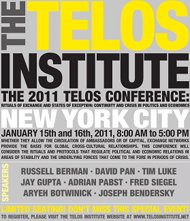By Marcia Pally · Tuesday, February 8, 2011 An earlier version of this essay was presented at the 2011 Telos Conference, “Rituals of Exchange and States of Exception: Continuity and Crisis in Politics and Economics.”
 In light of the 2008 global financial crisis, a reassessment of the global market system seems to be afoot. If neoliberalism (too much market) yields the Great Recession, if socialist planning (not enough market) produced the failed economies of the former Soviet bloc, and if social-market combinations (too much centralization of the market) progress towards the slow economic growth and high-cost programs of Western Europe, what are better options? In light of the 2008 global financial crisis, a reassessment of the global market system seems to be afoot. If neoliberalism (too much market) yields the Great Recession, if socialist planning (not enough market) produced the failed economies of the former Soviet bloc, and if social-market combinations (too much centralization of the market) progress towards the slow economic growth and high-cost programs of Western Europe, what are better options?
“New evangelicals,”[1] perhaps unexpectedly for non-believers, offer a few ideas—interesting for their mix of market and common-good positions, and for an apparent paradox. “New evangelicals” work with a sophisticated notion of the common good—though their beliefs and practices rely on the very eighteenth-century principles that fostered unregulated market development. That is, they uphold unencumbered entrepreneurialism in markets, but this commitment makes them entrepreneurs for the benefit of others. This becomes more interesting when one considers that the “new evangelical” paradox has significant effect on the circulation of money and people worldwide. The material here is taken from field research that I did between 2005 and 2010 and which will appear in a book later in 2011 (Eerdmans Publishing).
Continue reading →
By Richard Gilman-Opalsky · Friday, February 4, 2011 The following text was presented at the 2011 Telos Conference, “Rituals of Exchange and States of Exception: Continuity and Crisis in Politics and Economics.”
(For the people of Tunisia.)
 There is a tension in Guy Debord’s crisis theory, which stems from a particular bifurcation in his own consideration of crisis. On the one hand, Debord sought to completely deconstruct the Marxian logic of crisis, but on the other, his own situationist theory of praxis depended on the relationship between crisis and opportunity. In short, Debord abandons any notion of the grand crises of world-historical significance, and looks instead to minor crises of ideology and critique. There is a tension in Guy Debord’s crisis theory, which stems from a particular bifurcation in his own consideration of crisis. On the one hand, Debord sought to completely deconstruct the Marxian logic of crisis, but on the other, his own situationist theory of praxis depended on the relationship between crisis and opportunity. In short, Debord abandons any notion of the grand crises of world-historical significance, and looks instead to minor crises of ideology and critique.
Continue reading →
By Timothy Stacey · Tuesday, February 1, 2011 A longer version of this essay was presented at the 2011 Telos Conference, “Rituals of Exchange and States of Exception: Continuity and Crisis in Politics and Economics.”
 The term “Excellence Critique” connotes a broad array of thinkers, including but not limited to Alisdair MacIntyre, Charles Taylor, Stanley Hauerwas, John Milbank, and Robert Spaemann.[1] While there are clear problems lumping these thinkers together, they share some important qualities. Two such qualities I shall discuss here. The term “Excellence Critique” connotes a broad array of thinkers, including but not limited to Alisdair MacIntyre, Charles Taylor, Stanley Hauerwas, John Milbank, and Robert Spaemann.[1] While there are clear problems lumping these thinkers together, they share some important qualities. Two such qualities I shall discuss here.
First, none of these thinkers deny the successes of liberalism. All agree that liberalism generates the most “wealth” and “freedom” when these terms are measured via monetary success and moral relativism, respectively. Their argument is not one of efficiency; it is one of excellence. Liberalism, according to these thinkers, fails to fully embrace human flourishing. One way of understanding this failure, I will suggest, is via liberalism’s teleological deficit. By teleology I intend a shared, transcendental, and ineffable conception of the good.
Continue reading →
|
|
 In light of the 2008 global financial crisis, a reassessment of the global market system seems to be afoot. If neoliberalism (too much market) yields the Great Recession, if socialist planning (not enough market) produced the failed economies of the former Soviet bloc, and if social-market combinations (too much centralization of the market) progress towards the slow economic growth and high-cost programs of Western Europe, what are better options?
In light of the 2008 global financial crisis, a reassessment of the global market system seems to be afoot. If neoliberalism (too much market) yields the Great Recession, if socialist planning (not enough market) produced the failed economies of the former Soviet bloc, and if social-market combinations (too much centralization of the market) progress towards the slow economic growth and high-cost programs of Western Europe, what are better options? 

